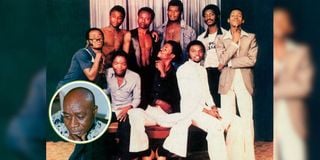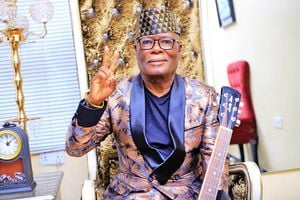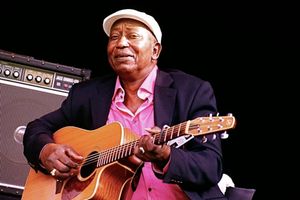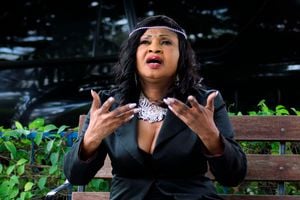
Members of the famous Congolese band Super Mazembe. Inset: Alley Katele, the composer of ‘Kasongo’.
The ever-green hit, in which a woman begs her estranged husband to return home, is trending in Kenya, but with a social and political twist.
Orch Super Mazembe (also popularly known as Bana Mushosho) in the mid-1970s is once again riding a wave of popularity, as netizens use its song to pass cheeky, if not humorously-packaged messages to Kenya’s top political leadership.
The legendary Alley Katele, who wrote the song, was the chief composer of Super Mazembe. He also did the lead vocals to “Kasongo”.
Before the band members settled in Kenya in the mid-1970s, they were based in Zambia, where they also composed and recorded several songs in the Bemba language.
The Mazembe Band initially worked under revered Zambian musician and producer Nashil Pinchen Kazembe.
The Lingala composition titled “Kasongo” by Super Mazembe Jazz Band has lately become a vehicle for the delivery of comical yet searing political and social messages.
Back to the song and its original meaning and composition in a moment.
“Kasongo” took a new, vibrant image during the impeachment of then-Deputy President Rigathi Gachagua. Social media creatives seized the beat and political frenzy, injecting satirical lyrics.
Now, there are those who have come up with lyrics hitting at the government – depicting a top political figure going into a burrow, as criticism of his leadership.
Social media has been awash with memes of the song, with some even using images of animals to depict their own interpretations of “Kasongo”.
Travel to many countries
The soundtrack was first used on a viral video of a warthog running into its burrow, perhaps to show the forgetfulness of the animal.
In the original version, the troubled woman not only implores her husband to return home, but also to “alert her when he comes back as the children and others on the street keep asking about his whereabouts”.
According to veteran music promoter DS Njoroge, people need to understand the true meaning of the song and not misinterpret it as is happening.
“To the best of my knowledge, “Kasongo” has nothing to do with lies or being a liar. It is about a woman appealing to her husband to return to their matrimonial home,” Njoroge says.
But many Kenyans, it appears, are not interested in the original lyrics. What matters to most is using the melody and beats of the song in their own way.
Jose Okello, who was a guitarist of the original band and is now 71, told the Saturday Nation from his home in Australia that “Kasongo” was one of the most treasured compositions the group ever recorded.
“The popularity of the song made us travel to many countries in Africa and other parts of the world for performances. Fans liked the song too, and I believe its recording was the turning point for the band,” Okello says.
The re-inventing of “Kasongo” on social media is part of a trend in which Kenyans of all ages are revisiting popular Congolese oldies.
This has been evident with many school choirs redoing some of the Lingala classics, including “Ndaya” by Congolese diva M’pongo Love, “Azda” by Franco Luambo Luanzo Makiadi and “Nakei Nairobi” done by Mbilia Bel.
Popular Kenyan Lingala music Tiktoker Lynder Matiko “rhumba Queen”, is among those who recently did a cover version of “Kasongo”.
She has in the past done cover versions of other songs in TikTok like those by UK-based Kanda Bongo Man, Franco’s TPOK Jazz Band, Lady Issa, Mbaraka Mwinshehe Mwaruka and many others .
Contrary to popular belief, the song was not about any individual member of the band. It was about a fictitious person Katele had in mind. Incidentally, Super Mazembe Band had two Kasongos – guitarist Kasongo Songo Ley and singer Kasongo wa Kanema.
Kanema joined Super Mazembe long after the song had been released. He was a top tenor vocalist, perhaps East Africa’s best, after the demise of Super Mazembe Band leader Didos Longwa. He was a cog of rhumba and will be fondly remembered for his lead vocals in the ‘Kakolele Viva Christmas’ track.
Kanema joined Super Mazembe from Orchestra Bwambe Bwambe, an offshoot of Orchestra Baba Gaston’s Baba National Band.
After the death of Didos Longwa, Kanema took over as band leader of Super Mazembe. Kasongo wa Kanema died in Nairobi in May 2020 and was buried at Lang’ata cemetery.
A happy father
The song was released in two versions – one in Zambia and the other in Kenya.
Other than “Kasongo”, Super Mazembe released popular songs like “Nabimakate”, “Shida”, “Sela Keba” and “Mwana Mazembe”.
Most of the hits were composed by Alley Katele.
US-based crooner Samba Mapangala, then the band leader of Les Kinois and later Virunga, was a guest singer on some of Super Mazembe recordings.
Mapangala’s groups and Orch Les Mangelepa were among those that were rivals in popularity in Nairobi in the 1970s, 1980s and 1990s.
Super Mazembe, under the leadership of Longwa Didos Mutonkole, gained popularity especially by performing at Agricultural Society of Kenya fairs across the country.
Some of the prominent members of the original Super Mazembe that came to Kenya in 1970s were guitarists Bukalos Bukasa, Rapok Kayembe and Atia Jo Mwanza.
Others were drummers Dodo Doris and Petit Musa and singer Charles Makila.
Those who joined the group later include singers Kanema, Lovy Longomba, Kandolo Rondo and Madjo Maduley.
Also in the list were guitarists Loboko Pasi and Okello.
Loboko Pasi is the only surviving member of Super Mazembe Band still based in Nairobi. He was active in the band from the 1980s to late 1990s.
Contacted by the Saturday Nation, Loboko said he was elated to hear “Kasongo” has regained popularity, especially through social media.
“It is encouraging to discover that many Kenyans still have fond memories of one of the greatest songs ever done by Super Mazembe,” he says.
“This is despite the changing of the lyrics by some social media users. I only hope that people get the correct interpretation of the song, which has more to do with domestic issues than being a liar or double dealer.”
He adds that during live shows, the song was often requested for replays by fans.
Loboko is now with the Mazembe Academia group. Having lived in Mombasa for a while, he recently shifted to Nairobi for the regroup. He is buoyed by the resurgence of “Kasongo” on social media.
Elsewhere, the Bana Mazembe Band (another offshoot of Super Mazembe) is under the leadership of Ngoe Disco Longwa, the son of Super Mazembe Band leader Longwa Didos. The group performs at various spots in Nairobi.
Ngoe Disco Longwa says while the reinvention of the song is good, he wishes young people appreciate it for what it was.
“I wish the youngsters would understand the correct meaning of the lyrics and use the song properly for the advancement of society instead of using it to ridicule leaders,” Longwa says.
He adds that his father would be happy had he been alive.
“It feels good as an artiste when your effort is recognised by a big section of the society. I take pride in his leadership skills that enabled the group to do such tremendous work,” Longwa says.
Another version of “Kasongo” (with no link to the Super Mazembe one) was released in Tanzania by then-Dar es Salaam-based Maquis Du Zaire band in Tanzania in the late 1970s.
Like the Super Mazembe “Kasongo”, it implored the man to return (Naomba unirudie Kasongo). It was sang by Congolese star King Kiki.
The mellow-voiced singer died in Dar es Salaam after a long illness recently.
With the many recently released cover versions of the “Kasongo”, there is still plenty to be heard of the song.












